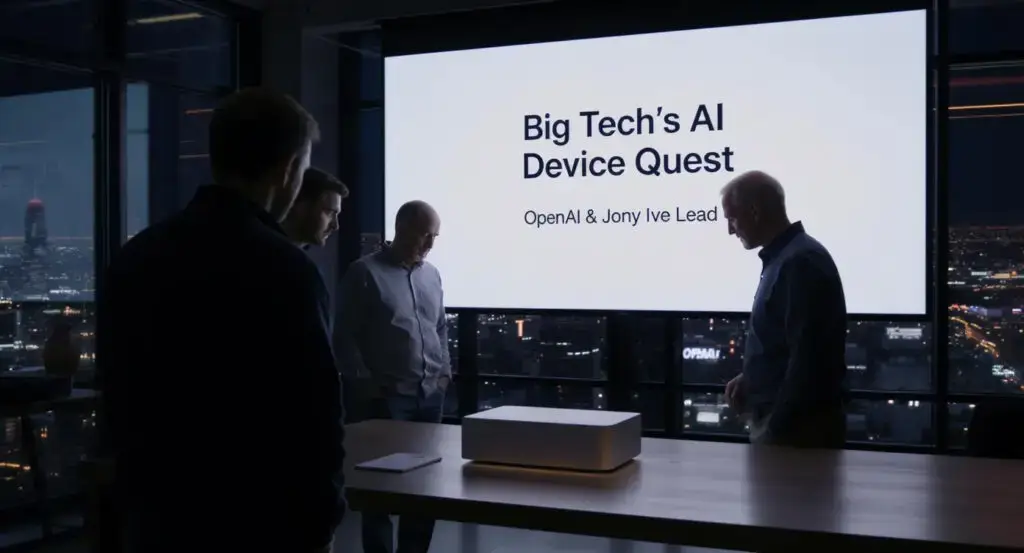In Silicon Valley, a new race is heating up, one not for faster chips or smarter software, but for a piece of hardware that could redefine how we interact with artificial intelligence. As AI rapidly reshapes the digital landscape, tech giants are rushing to build a device that goes beyond today’s smartphones, smart speakers, or wearables. Leading the charge is OpenAI, which has partnered with legendary designer Jony Ive in an ambitious bid to invent the AI device of the future.
Jony Ive, the creative force behind the iPhone, iPod, and MacBook during his tenure at Apple, is now spearheading a radical departure from the traditional tech form factor. “The products that we’re using to deliver and connect us to unimaginable technology are decades old,” Ive said. “Surely there’s something beyond these legacy products.”
While details remain scarce, what’s known is that the envisioned device will not have a screen, nor will it be worn like a watch or clipped on like a brooch. According to OpenAI CEO Sam Altman, a prototype already exists and he’s enthusiastic. “It’s the coolest piece of technology that the world will have ever seen,” he teased.
Learning from Flops: AI Hardware’s Cautionary Tales
This isn’t the first attempt to break ground in AI-first hardware. In 2024, startup Humane launched the AI Pin, a $699 wearable designed to replace smartphones. But despite a wave of hype, it failed to catch on and was quietly pulled from the market less than a year later. For many, it served as a reminder that even groundbreaking technology needs to resonate with how people live and communicate.
That’s why this new generation of AI hardware isn’t just about sleek design or novel form factors; it’s about functionality that feels human. “The type of device isn’t as important as whether it’s built with pro-human values,” said Rob Howard of Innovating with AI.
From Cloud to Companion: Shifting AI to the Edge
A major challenge for next-gen AI devices is making them functional even without relying constantly on the cloud. Experts warn that overdependence on remote servers raises concerns over privacy, latency, energy usage, and cost.
“You can’t push it all out to the cloud,” said Olivier Blanchard, principal analyst at Futurum. As a result, the vision for AI is turning local towards smart, discreet hubs that listen, think, and respond in real time without needing to send every word back to a data centre.
This approach echoes Google CEO Sundar Pichai’s concept of “ambient computing,” where AI fades into the background, always present but never obtrusive. It’s a vision of technology that is more intuitive and less intrusive, more assistant than appliance.
Big Tech Bets Big: From Meta to Amazon, Everyone’s In
OpenAI isn’t alone in this race. Google is building mixed-reality glasses that harness AI to offer real-time, context-aware feedback. Meta continues its push into AI wearables and virtual interfaces. Amazon is expanding Alexa’s capabilities, moving closer to natural, conversational interactions.
Even Apple, where I’ve made his name, is feeling the pressure. The company has taken a slower, more cautious approach to integrating generative AI into products like Siri and the iPhone, drawing criticism from some industry observers who believe the Cupertino giant is falling behind.
Still, Apple’s reticence may stem from the high stakes involved. If the next-generation AI device truly replaces the smartphone, it could upend the very ecosystem Apple helped build.
The Future Is Talking: Voice, Not Taps, May Lead the Way
At the heart of this movement is a shift in how we use machines. Experts widely agree that voice, not touchscreens, will become the primary interface for AI in the near future. Whether it’s through glasses, pins, or invisible hubs, the goal is to interact with AI as seamlessly as we do with another person.
For now, smartphones remain deeply embedded in daily life. “It’s going to take a lot to replace them,” said CCS Insight analyst Ben Wood. But change is on the horizon.
OpenAI, now bolstered by a multibillion-dollar investment and the star power of Ive and recently hired tech executive Fidji Simo, appears determined to lead that change. The company is betting not just on smarter AI but on smarter ways to live with it.
In the race to create the perfect AI device, the question isn’t just what it will look like but how human it will feel.























